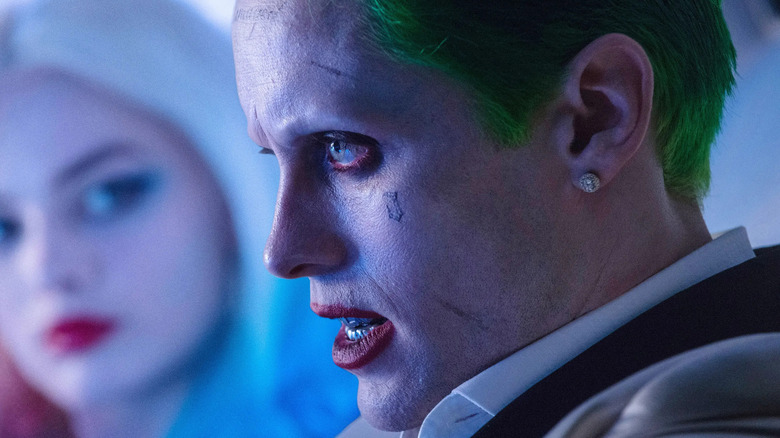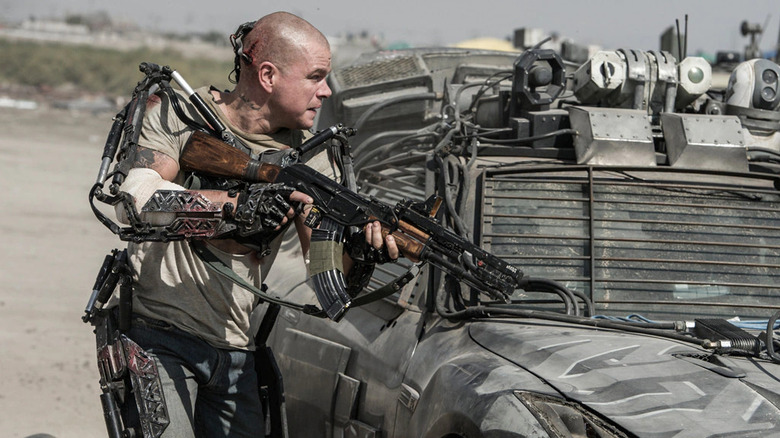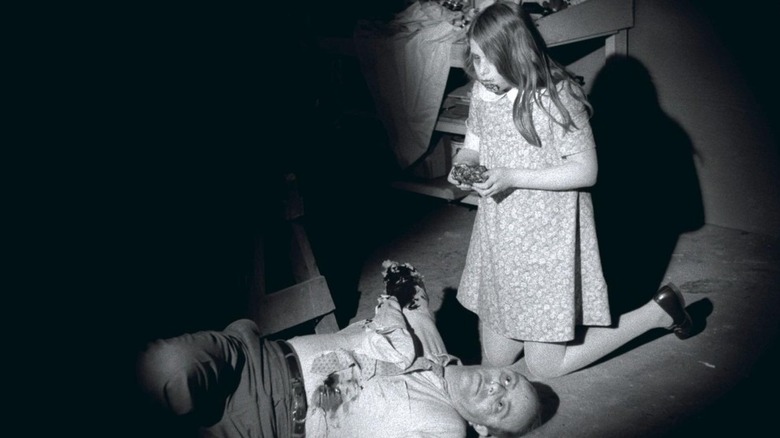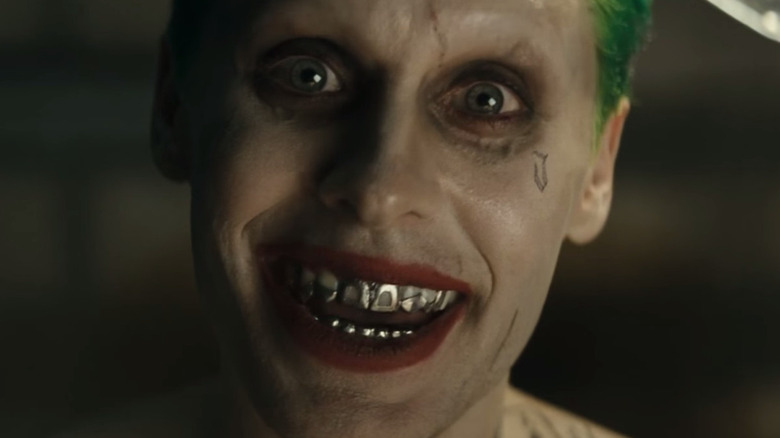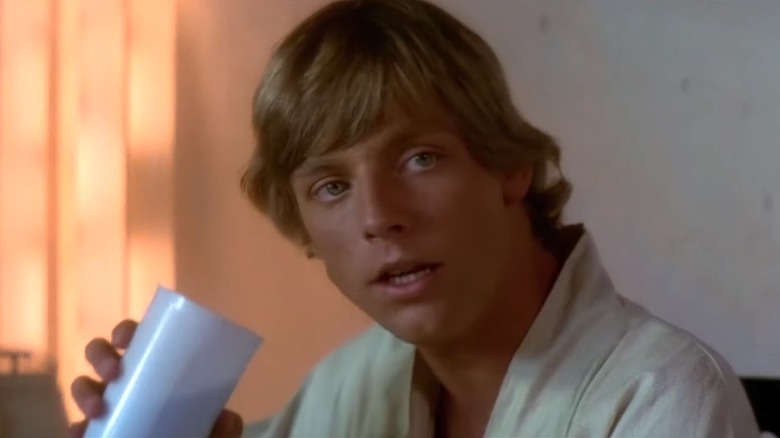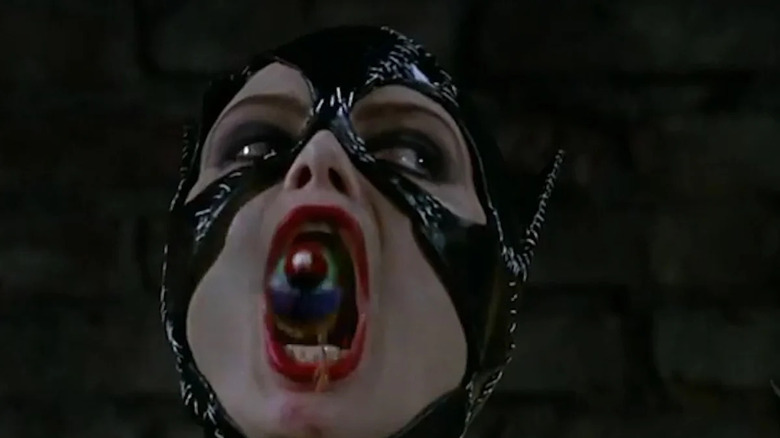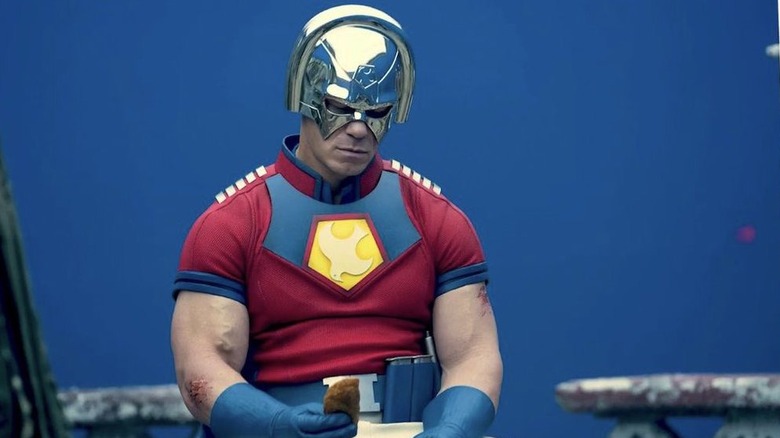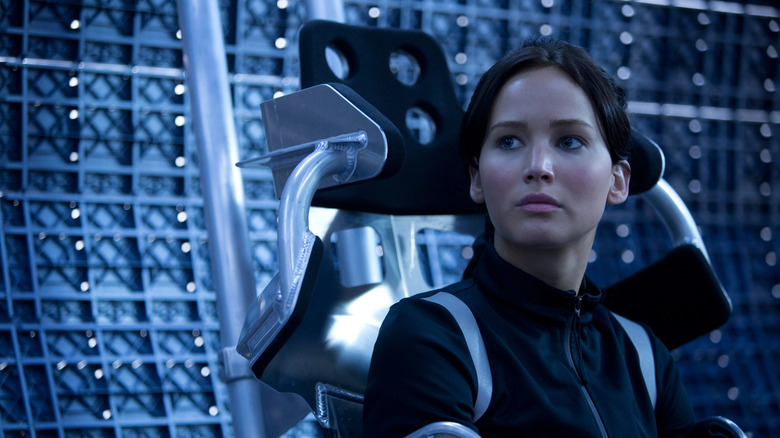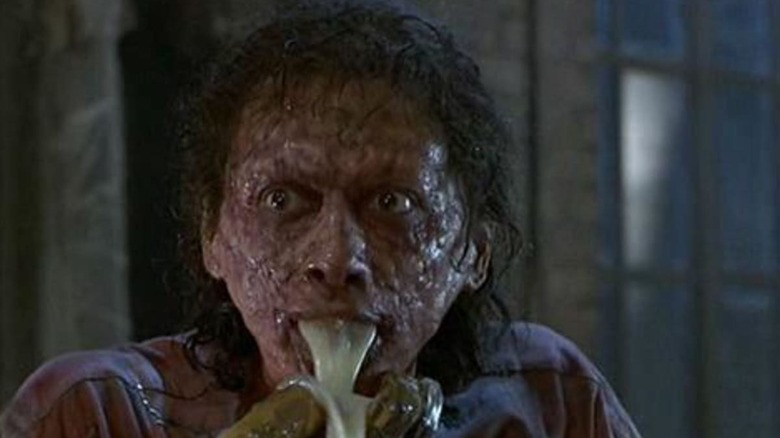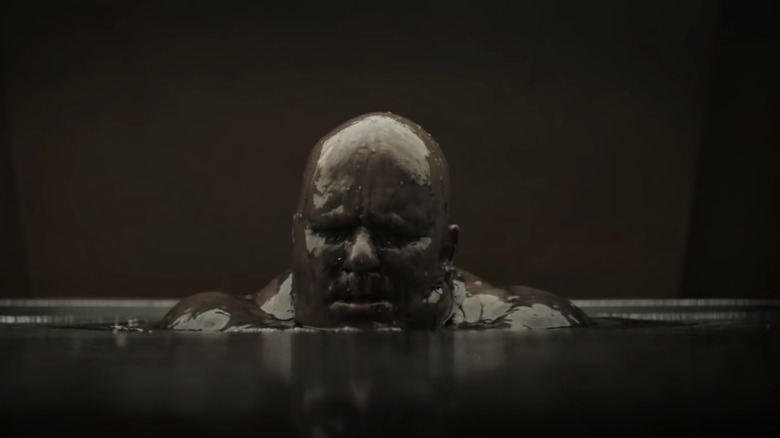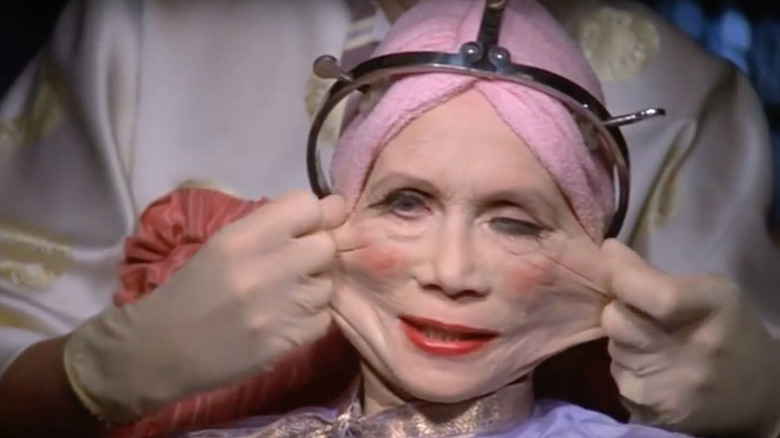Sci-Fi Movies That Made The Cast Do Gross Things
There are a lot of gross moments in classic science fiction films. The most vivid sci-fi movies can transport the audience to a place that they've never been before. We feel all the emotions that the characters are experiencing. If a sci-fi movie makes us feel uncomfortable during a climactic scene, that's a good thing! It means that the filmmakers, cast, and crew are doing what they need to do to immerse us in the world.
That being said, there are a few science fiction movie moments that push the boundaries of good taste. It's hard to get the image of the chestburster in "Alien," the creepy bugs in "Snowpiercer," or the murderous alien in "Men in Black" out of your head. Although these moments may have rubbed audiences the wrong way, some science fiction movies required the cast to do even grosser things.
Method acting is a controversial technique. It's nice to know that some actors are willing to go the extra step to get into character, but making your co-stars uncomfortable is never a good idea. Filmmaking is all about respect. A filmmaker should respect their cast, and the cast should respect their director's vision. Going to extreme lengths to create a fictional story is only worth it if everyone involved with the production is on the same page. The history of science fiction films is filled with fun behind-the-scenes anecdotes. These sci-fi movies made the cast do gross things.
Matt Damon filmed In a garbage dump, Elysium (2013)
Neil Blomkamp's 2013 sci-fi action film, "Elysium," takes place in a future in which the wealth disparity is even more extreme than it is today. The rich live in a space station called Elysium that floats above the Earth. Only those that can afford to live on the expensive station are treated to the full benefits of the healthcare system. Those that remain on Earth are forced to wade through the remaining resources to survive. The planet has essentially become a live-action version of "Wall-E." It's a giant wasteland piled with trash.
Matt Damon stars as Max Da Costa, a former criminal who works grunt labor. When Max is exposed to a lethal dose of radiation, he decides to lead a mission to break into the Elysium station. The film does a great job setting up why Max's situation is so unfair. To fully immerse himself in the character, Damon had to film many scenes in a garbage dump filled with fecal matter. Blomkamp said that the set "smelled like a sewage processing plant."
"Elysium" is effective because it is grounded in a recognizable environment. It's easy to see how our world could transform into the wasteland that the film depicts. While filming in a pit of garbage might not have been fun for Damon, it shows the importance of taking care of our planet and providing care to those in need.
The cast had to chew animal Intestines, Night of the Living Dead (1968)
You can't talk about zombie movies without discussing the work of the great George Romero. Romero defined what we think of as the "living dead." Almost every zombie film that has been released since Romero's "Night of the Living Dead" has been inspired by his work in one way or another. Romero didn't treat the concept of a zombie pandemic as camp. "Night of the Living Dead" is just as haunting now as it was when it was first released.
"Night of the Living Dead" features some of the most groundbreaking makeup work in cinematic history. However, the "blood and guts" in the film were just as disgusting to create as they appeared on the big screen. The extras who played the zombies had to chew on animal intestines and bones. In a commentary track, "Night of the Living Dead" co-writer John Russo said that it "just stunned us that they chomped into these organs."
Although this is a convincing way to make zombies look dangerous, the true horror of "Night of the Living Dead" is mankind. It's not the radiation from the Venus probe that drives the surviving humans insane. It's the fear and paranoia that someone else might be infected. Romero continued this social commentary in the sequels "Dawn of the Dead" and "Day of the Dead."
Suicide Squad's cast received Jared Leto's gifts, Suicide Squad (2016)
Heath Ledger famously went to extreme lengths to dissect the psychology of the Joker during the filming of Christopher Nolan's 2008 film, "The Dark Knight." Ledger's commitment to the role ended up creating one of the greatest screen villains of alltime. He set a high standard for anyone brave enough to take on the role of the Joker afterward. While Jared Leto tried to show a similar intensity when he landed the role of the Joker in 2016's "Suicide Squad," the only people that Leto was able to terrify were his co-stars.
Leto's on-set behavior became notorious. Leto redefined the phrase "method acting" by gifting his co-stars with "presents" from the Joker. Margot Robbie received a live rat, Viola Davis got a dead pig, and Scott Eastwood mentioned condoms and pornographic magazines. Will Smith admitted that he "never met" Leto on set because he was always in character as the Joker.
It's ironic that Leto poured so much effort into the role because the Joker is barely in "Suicide Squad." It's the Enchantress (Cara Delevingne) who serves as the primary antagonist that Task Force X is assigned to take down. The few scenes that Leto has in the film don't shed that much light on his motivations. The romantic storyline between the Joker and Harley Quinn simply feels awkward. Leto tries so hard to be "crazy" that he just comes off as obnoxious.
Mark Hamill had to drink gross blue milk, Star Wars: Episode IV — A New Hope (1977)
The "Star Wars" franchise includes some pretty revolting aliens and monsters. Between the Dianoga in "A New Hope," the Wampa in "The Empire Strikes Back," and the Sarlacc pit in "Return of the Jedi," the series has a fair number of creatures that we wouldn't want to run into. However, Mark Hamill said that one of the grossest scenes to shoot featured a common drink.
In "A New Hope," Luke is served a glass of blue milk by his aunt, Beru Lars (Shelagh Fraser). Hamill said that the "warm, oily, sickly-sweet milk dyed blue from the movie was gag-inducing." As a young actor trying to make it in the industry, Hamill said that he "gulped it and acted like I liked it without vomiting." However, the new "blue milk" frosty smoothie that is served at Disney Parks' "Star Wars: Galaxy's Edge" met with his approval.
Although it seems like a small detail, the blue milk in "A New Hope" emphasizes that there is nothing special about the Beru household. Luke is raised by earnest, working-class people so that his existence can be hidden from the Empire. The idea that Luke was just a teenager who wanted to leave home and go on adventures made him a more relatable character. Apparently, he still has a fondness for his favorite childhood beverage. Luke slurps down a cup of Ahch-To milk in "The Last Jedi."
Michelle Pfeiffer put a bird in her mouth, Batman Returns (1992)
Filmmaker Tim Burton is renowned for his idiosyncrasies. Burton's odd perspective on the world helped to create a distinctly odd version of Gotham City in 1989's "Batman." Burton cranked the absurdity up a notch in his 1992 sequel, "Batman Returns." Although Jack Nicholson's performance as the Joker in "Batman" was over-the-top, he was overshadowed by the madness of Danny DeVito's Penguin and Michelle Pfeiffer's Catwoman.
Catwoman is the femme fatale of the DC universe. She rides the line between hero and villain and encourages Batman to pursue his selfish interests. Pfeiffer said that she was obsessed with the character during her childhood. She was devastated when Burton originally cast Annette Bening in the role for "Batman Returns." When Bening became pregnant, Pfeiffer promised that she would do everything that she could to commit to the part.
That commitment included some pretty gross moments on set. During one sequence, she had to put a live bird in her mouth. Although she was able to film the scene in one take, Pfeiffer admitted that Burton "liked to torture me a little bit." However, Burton had nothing but kind words to say about Pfeiffer's performance. "She also does these funny physical things," he remembers. "Her eyes look like special effects, but that was all done by her." Although Anne Hathaway and Zoe Kravitz delivered admirable performances, Pfeiffer remains the definitive screen version of Catwoman.
John Cena ate 36 empanadas, The Suicide Squad (2021)
John Cena has had an interesting career trajectory. Although his imposing reputation from the WWE would seemingly prepare him for the physicality of action movies, Cena has shown that he is just as adept as a comedian. Cena showed his versatility with his performance as Peacemaker in James Gunn's 2021 film "The Suicide Squad." An unflinching patriot who is proud of his ruthlessness, Peacemaker ultimately becomes a villain in the story. Cena may have had to perform some dangerous stunts during his WWE career, but nothing could prepare him for the odd task that "The Suicide Squad" required.
In the film, Peacemaker's appetite draws the ire of Rick Flag (Joel Kinnaman). A behind-the-scenes video shows Cena eating 36 empanadas. It's an element of the story that could easily be cut out, as it's only there for comedic effect. Cena's devotion to the bit just makes the character more unique.
Although having to devour multiple empanadas was probably not a pleasant experience, Cena was rewarded with a spinoff series. The HBO Max original show "Peacemaker" picks up with the character's adventures after the end of "The Suicide Squad." Although "Peacemaker" satirizes the jingoism of military culture, Cena adds the same comedic sensibilities that made his empanada scene so hilarious. His appetite hasn't slowed down at all!
Jennifer Lawrence had to eat raw fish, The Hunger Games: Catching Fire (2013)
Following the success of the "Harry Potter" franchise, many studios attempted to create a similar phenomenon by adapting widely popular young adult book series. "The Hunger Games" franchise was one of the few that was successful. "The Hunger Games" distinguished itself with its dark tone, graphic violence, and weighty themes. The franchise explores the dehumanizing effects of fascism, the obsession with celebrity culture, and the pressure put on young people to fix their parents' problems. The success of "The Hunger Games" franchise can be traced to the casting of Jennifer Lawrence.
Lawrence's emotional performance as Katniss Everdeen gives the audience a character that they can relate to. Katniss is raised in a poor, isolated community. In "The Hunger Games: Catching Fire," she is whisked away from her home to engage in another round of the games. To get into character, Lawrence had to eat raw fish. She confirmed that it "tastes exactly how it smells." Although the crew tried to convince her that it was regular sushi, Lawrence could tell that something was different about her meal after just one bite.
Experiencing some of the same challenges that Katniss goes through made Lawrence's performance more authentic. Katniss grows to detest the government and fight for an equal disbursement of resources. It was important for Katniss to feel like an outsider who was tasked with an impossible goal.
The cast had to be on set with vomit mix, The Fly (1986)
Nobody does science fiction body horror like David Cronenberg. Cronenberg took on a difficult task when he signed on to create a remake of the 1958 monster movie "The Fly." While the original version of "The Fly" is a lot of fun, it's a campy, silly movie, Cronenberg decided to take the story in a more serious direction. The film is ultimately a tragedy. Seth Brundle (Jeff Goldblum) thinks that he has found a brilliant way to teleport between pods. Brundle is slowly transformed into an insect-like creature after his experiment goes awry.
It's heartbreaking to watch this likable character transform into a disgusting monster. However, the acidic vomit that Brundle spews was just as gross to create as it looks on screen. Makeup artists Chris Walas and Stephan Dupuis created a mixture of honey, flour, and food coloring. There was no way for Goldblum to avoid the gross smell. He spent over five hours in makeup to become the "Brundlefly." Walas and Dupius won an Academy Award for their work.
Walas and Dupuis planned out Brundle's transformation through seven stages. Although the changes to his body are subtle at first, he gradually becomes more grotesque as his condition worsens. Goldblum said that he had been impressed by how emotional he felt reading Cronenberg's script. Due to its release in the mid-1980s, "The Fly" was considered to be a metaphor for the AIDS epidemic.
Stellan Skarsgård had to swim naked in Baron Harkonnen makeup, Dune (2021)
"Dune" fans know what disappointment is like. David Lynch's 1984 film adaptation of Frank Herbert's beloved novel failed to live up to the high expectations that readers had. Lynch's film had many issues, but chief among them was the dull way that it presented the political conflict. "Dune" is a political thriller. After House Atreides is called to take over the desert planet Arrakis by the Emperor, House Harkonnen initiates a conflict with their longtime rival.
Although Kenneth McMillan's performance as Baron Harkonnen is somewhat endearing, it didn't have the menace required to bring one of "Dune's" most fearsome antagonists to life. Thankfully, Denis Villeneuve's 2021 adaptation improved upon many of the errors that plagued Lynch's version. Stellan Skarsgård's performance as Baron Harkonnen is frightening. Skarsgård had to wear layers of uncomfortable makeup to transform into the villainous overlord.
Skarsgård spent over six hours in the makeup chair before filming scenes in which Baron Harkonnen swam naked. In order to wear the massive body suit, Skarsgård said that he "had a big tube going through which they were pumping cold water all the time." He said that "dragging around 88 pounds and trying to act normal physically is pretty hard." While he admitted that it was "not very dignified," Skarsgård reportedly asked if he could film more scenes where the Baron swam around in his giant tub.
Katherine Helmond had to wear layers of uncomfortable makeup, Brazil (1985)
"Brazil" might be the weirdest film that Terry Gilliam has ever made — and that's certainly saying something. Ever since his days as one of the stars of "Monty Python," Gilliam has taken an idiosyncratic approach to established cinematic genres. Gilliam's 1985 masterpiece, "Brazil," is his most accomplished work of satire. The film is simultaneously a compelling story of a revolution, a hilarious deconstruction of bureaucracy, and a foreboding warning about the failures of capitalism. The film takes place in a dystopian world in which bureaucracy, pollution, overpopulation, and consumerism have transformed society. The similarities between the grotesque future of "Brazil" and today's world are more than a little unnerving.
One of the points that Gilliam emphasizes is the obsession with body image. In one of the more disturbing scenes in the film, socialite Mrs. Ida Lowry (Katherine Helmond) has her skin stretched behind her head so that she will look younger. When Gilliam approached Helmond about the role, he said that she was "not going to look very nice in it." He wasn't lying. Helmond had to spend ten hours getting the makeup glued to her face. At one point, shooting had to be postponed because Helmond developed painful blisters on her face.
It's an unsettling scene, but it serves an important purpose in the film's social commentary about beauty. To what lengths are we willing to go to preserve our youth?
